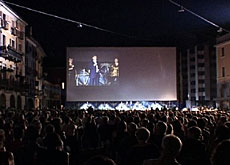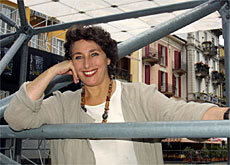Culture boss turns the spotlight on Locarno

David Streiff, the head of the Federal Office for Culture, was the director of the Locarno International Film Festival for over ten years.
As the 56th edition got underway, swissinfo asked him for thoughts on the festival and why Swiss cinema was going through a lean patch.
swissinfo: How many days are you spending at this year’s Locarno International Film Festival?
David Streiff: I will be there for the first four days. I regret, however, that I will not be able to see any, or only a few, of the films, because I will be participating in official events and meetings. After that I have to return to my work; staying at the festival would be a luxury I cannot afford at the moment.
swissinfo: You were director of the festival from 1981-1991. What distinguishes the Locarno of Irene Bignardi from the Locarno of David Streiff?
D.S.: It is primarily the size that makes the difference. I took over the festival at a difficult time when there were voices in favour of closing it down, but I eventually managed to engineer a turnaround. The success led to visitors overrunning the festival, but nothing in comparison to today, of course.
The number of visitors has changed the character of the festival. Additionally the number of films shown has increased massively. Today it is no longer the case that everyone watches the same films. It’s like a supermarket: everyone picks out what they want.
swissinfo: Do you regret this development?
D.S.: Yes and no. It is obviously extremely positive that the international standing of Locarno has increased enormously. The price, however, is that the kind of freedom and intimacy that the festival had in the past, no longer exists today.
swissinfo: What significance does Locarno have for the Swiss film industry?
D.S.: As a showcase, Locarno was always an important festival. It is the biggest and best chance to introduce an international audience to Swiss cinema. The disadvantage of today’s structure, however, is that with such a large selection of films, individuals can decide whether to watch any Swiss films at all during the ten days of the festival.
swissinfo: The Swiss feature film industry is said to have been in crisis for years. What is the problem?
D.S.: There are two problems: the market and the money. Generally non-American films have problems. Furthermore in Switzerland the different national languages hinder a film’s chances of recognition.
The Röstigraben [the mythical divide between the French and German language regions] is very pronounced when it comes to cinema. And for Italian-speaking Switzerland, the subtitling is too much work. Therefore the Swiss film industry cannot keep up with its bigger rivals.
The films that are most successful in Switzerland, such as “Trouble in Havana”, are usually not suitable for export.
Secondly, we have financial problems. Feature films are generally very expensive to make. Most feature films require large budgets which don’t exist in Switzerland. Swiss producers have to rely on international co-productions to produce occasional Swiss feature films. We will only change this situation through a significant increase in film budgets – particularly from the federal authorities.
swissinfo: Why doesn’t Switzerland invest more money in feature films?
D.S.: This is a political decision. We haven’t been able to make this clear enough in the past that this is not just about money for culture but money for the economy. If we had a stronger production infrastructure in Switzerland that would be a greater economic factor.
swissinfo: What are the reasons for that?
D.S.: Traditionally a Swiss film is a labour of love. There are only very few producers in Switzerland who work with limited budgets, once in a while make a profit and then invest in another risky project. An example is producer Ruth Waldburger who will be awarded the Raimondo Rezzonico prize this year in Locarno.
swissinfo: What value does the government place on film?
D.S.: It is very important. The government has a legal responsibility not only for film production but also for the promotion of films and ensuring a wide mix of international films. This is also reflected in the budget, but there should be more money.
swissinfo: What is your best memory from Locarno?
D.S.: The first time I realised that my programme worked. It was at the Swiss premiere of the wonderful film by the brothers Taviani “La notte di San Lorenzo”. I showed it on the night of August 10, 1982, at the Piazza Grande. For the first time more than 2,000 people were in the Piazza Grande. 4,000 spectators was a sensational number at the time. Today it would almost be a flop if so few people showed up. For me this was a quantum leap.
swissinfo-interview: Hansjörg Bolliger (translation: Daniela Silberstein)
The Federal Office for Culture was set up in 1989.
David Streiff took over as director in 1994.
Its 2003 budget is SFr220 million ($162 million).
SFr21.9 million is for the Swiss film industry, 10% goes to the festival.

In compliance with the JTI standards
More: SWI swissinfo.ch certified by the Journalism Trust Initiative











You can find an overview of ongoing debates with our journalists here . Please join us!
If you want to start a conversation about a topic raised in this article or want to report factual errors, email us at english@swissinfo.ch.